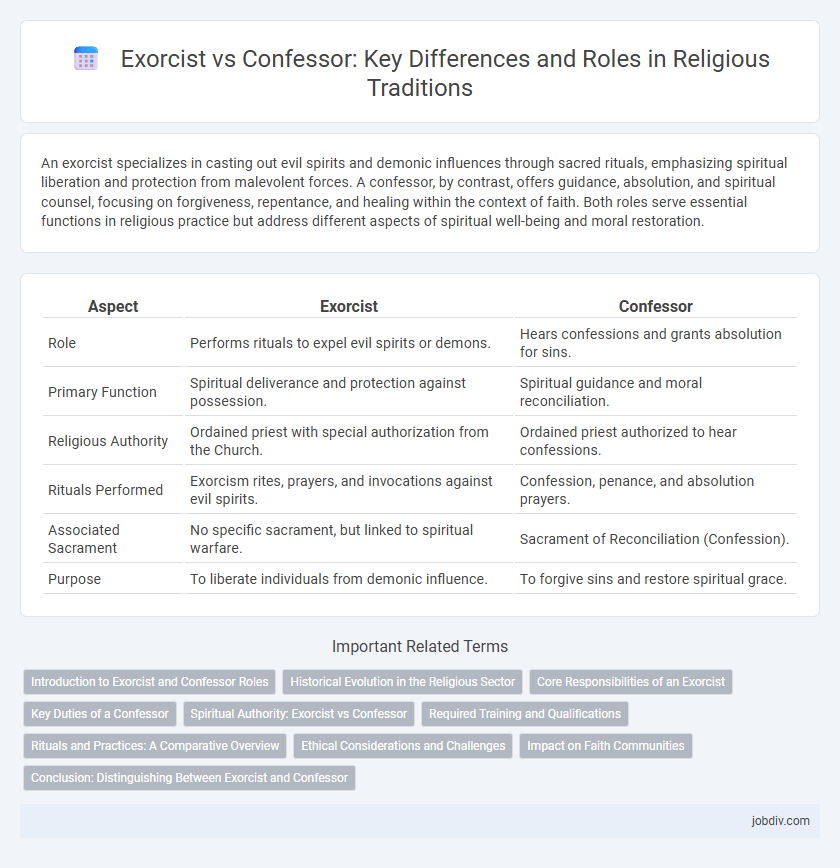An exorcist specializes in casting out evil spirits and demonic influences through sacred rituals, emphasizing spiritual liberation and protection from malevolent forces. A confessor, by contrast, offers guidance, absolution, and spiritual counsel, focusing on forgiveness, repentance, and healing within the context of faith. Both roles serve essential functions in religious practice but address different aspects of spiritual well-being and moral restoration.
Table of Comparison
| Aspect | Exorcist | Confessor |
|---|---|---|
| Role | Performs rituals to expel evil spirits or demons. | Hears confessions and grants absolution for sins. |
| Primary Function | Spiritual deliverance and protection against possession. | Spiritual guidance and moral reconciliation. |
| Religious Authority | Ordained priest with special authorization from the Church. | Ordained priest authorized to hear confessions. |
| Rituals Performed | Exorcism rites, prayers, and invocations against evil spirits. | Confession, penance, and absolution prayers. |
| Associated Sacrament | No specific sacrament, but linked to spiritual warfare. | Sacrament of Reconciliation (Confession). |
| Purpose | To liberate individuals from demonic influence. | To forgive sins and restore spiritual grace. |
Introduction to Exorcist and Confessor Roles
Exorcists are clergy members appointed to perform the rite of exorcism, aimed at expelling evil spirits and protecting individuals from demonic possession according to Catholic doctrine. Confessors, on the other hand, serve as spiritual guides who hear confessions, offer absolution, and provide pastoral counseling to help penitents reconcile with God. Both roles require deep theological training and a strong commitment to spiritual warfare and moral guidance within the Church's sacramental life.
Historical Evolution in the Religious Sector
The historical evolution of the roles of exorcist and confessor reveals distinct theological and liturgical developments within the Christian tradition. Originating in early Christianity, exorcists were early clerics tasked with casting out demons, a practice formalized through ritual prayers documented in the Roman Ritual of the 17th century. Meanwhile, the confessor's role expanded after the establishment of the sacrament of penance, becoming central to spiritual guidance and absolution, particularly institutionalized during the Council of Trent in the 16th century.
Core Responsibilities of an Exorcist
An exorcist primarily performs the solemn duty of casting out demons and spiritual evil from individuals, invoking sacred rites and prayers rooted in religious tradition. Their core responsibilities include discerning cases of genuine possession, administering the rite of exorcism with authorization from ecclesiastical authority, and providing spiritual support and counseling to those afflicted. Unlike confessors who focus on hearing confessions and granting absolution, exorcists engage directly in spiritual warfare to restore deliverance and healing.
Key Duties of a Confessor
A confessor's key duties include hearing confessions, providing spiritual guidance, and offering absolution to penitents according to Church doctrine. They must create a safe environment for sinners to reveal their sins, ensuring the confidentiality of the sacrament of confession. Confessors also help individuals discern moral truths and encourage repentance and spiritual growth through pastoral counseling.
Spiritual Authority: Exorcist vs Confessor
Spiritual authority in the role of an exorcist is rooted in deliverance ministry, where they confront and expel demonic forces through prayers of liberation and invoking divine power. In contrast, a confessor wields spiritual authority through the sacrament of confession, offering forgiveness, guidance, and absolution for sins to restore the penitent's relationship with God. Both roles embody different facets of spiritual authority: the exorcist battles spiritual oppression, while the confessor nurtures spiritual healing and reconciliation.
Required Training and Qualifications
Exorcists undergo specialized training that includes theological studies, psychological evaluation, and practical experience under the supervision of a senior exorcist, often requiring authorization from the local bishop. Confessors must possess a thorough understanding of canon law, moral theology, and pastoral counseling, typically achieved through seminary education and ongoing spiritual formation. Both roles demand strong faith, integrity, and adherence to Church doctrine, but exorcists require additional expertise in identifying and confronting demonic influences.
Rituals and Practices: A Comparative Overview
Exorcists perform rituals involving prayers, blessings, and the invocation of divine power to expel evil spirits, often using sacramentals like holy water and relics during formal ceremonies. Confessors primarily engage in the sacrament of confession, facilitating spiritual healing through penance, absolution, and guidance rather than physical rites. While exorcism centers on direct confrontation with demonic forces, confession emphasizes moral reconciliation and inner purification within the religious community.
Ethical Considerations and Challenges
Exorcists face ethical challenges in discerning genuine spiritual oppression from psychological conditions, necessitating collaboration with medical professionals to avoid harm. Confessors must maintain confidentiality while providing guidance that respects penitent autonomy and promotes genuine repentance. Both roles demand a careful balance of pastoral care, ethical responsibility, and adherence to Church doctrine.
Impact on Faith Communities
Exorcists confront spiritual oppression, fostering a profound sense of divine power and deliverance that strengthens community faith and resilience. Confessors nurture spiritual growth through guidance and forgiveness, promoting repentance and reconciliation within the congregation. Both roles deeply influence faith communities by addressing different aspects of spiritual well-being and reinforcing religious commitment.
Conclusion: Distinguishing Between Exorcist and Confessor
Exorcists perform rituals to expel evil spirits, focusing on spiritual liberation through specialized rites and prayers, while confessors provide guidance and absolution within the sacrament of confession, addressing personal sins and moral reconciliation. Understanding their distinct roles highlights the differences between spiritual deliverance and penitential counseling in religious practice. Clear differentiation ensures appropriate pastoral care tailored to the believer's specific spiritual needs.
Exorcist vs Confessor Infographic

 jobdiv.com
jobdiv.com